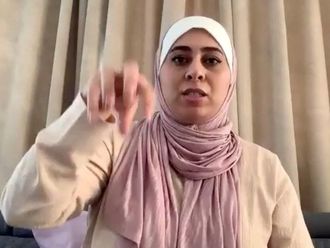Algiers: A five-minute film that instantly became a YouTube hit is exposing the gulf between young Algerians agitating for change and aging politicians readying to extend their rule at elections in less than a year.
“Rani Zaafane,” produced by Anes Bouzeghoub and dedicated to an Algiers street sleeper whose tirades turned him into a minor celebrity before he died in 2012, racked up a million views within a week of being posted.
Its themes of joblessness, corruption and inequality are still resonating. Long-running strikes by doctors and teachers demanding better working conditions point to deep frustration in a country where authorities are wary of change.
That anger will soon run into the buildup to next April’s presidential election, with speculation growing that 81-year-old leader Abdul Aziz Bouteflika will contest for a fifth term.
In the film’s opening scenes, Bouzeghoub, 28, targets a sense of entitlement in the offices of power: “University graduates have to sell cigarettes to survive while the illiterates strut about in parliament, issuing laws and giving orders.” Ministers have attacked the video, doing nothing to dent its appeal.
Bouteflika ended the civil war of the 1990s sparked when the army canceled elections Islamists were poised to win, and during his two decades in power has used oil wealth to fund a social safety net. Parliament is dominated by the president’s National Liberation Front.
It was enough to prevent the 2011 Arab uprisings taking root among a population still scarred by the war. The question is whether, even with the rise in oil prices, the nation can still afford it. And will Algerians continue to buy it?
“What happens after presidential elections in 2019 is the real challenge,” said Riccardo Fabiani, an analyst with research consultancy Energy Aspects.
While Bouteflika’s illness “inspires compassion and pity, it has also caused impatience and agitation” for change, said sociologist Ahmed Rouadjia.
Foreign currency reserves have halved as the government maintained its policies despite a slump in crude oil prices from 2014. As oil prices climb again this year, the government is expected to raise spending ahead of voting. Leaders try to avoid borrowing overseas, seeing it as eroding sovereignty. But relying on domestic funding risks depreciating the dinar and higher prices. The International Monetary Fund has warned that unless it tightens its belt, Algeria’s economic risks will continues to mount.
Bouzeghoub rejects accusations from some officials he’s profiting from others’ misery. “I’m used to making videos that are well watched,” he said. “But for this one, I was surprised by the huge number of positive reactions. I’m not political, my work is to show the reality of Algerian life.”
Many younger Algerians have given up on elections they don’t believe can bring change, deepening the divide with a ruling generation that prizes peace above all else.
“There’s a generational gap that means decision makers don’t take into account the social realities of young people,” said Belkacem Benzenine at Oran’s National Centre of Research in Social and Cultural Anthropology.
For one Algiers graduate, who asked only to be identified as Razak, “Rani Zaafane” is a reminder of what could be. “It tells of a reality that’s bitter but real,” he said. “At the same time, there’s a message of hope.”












